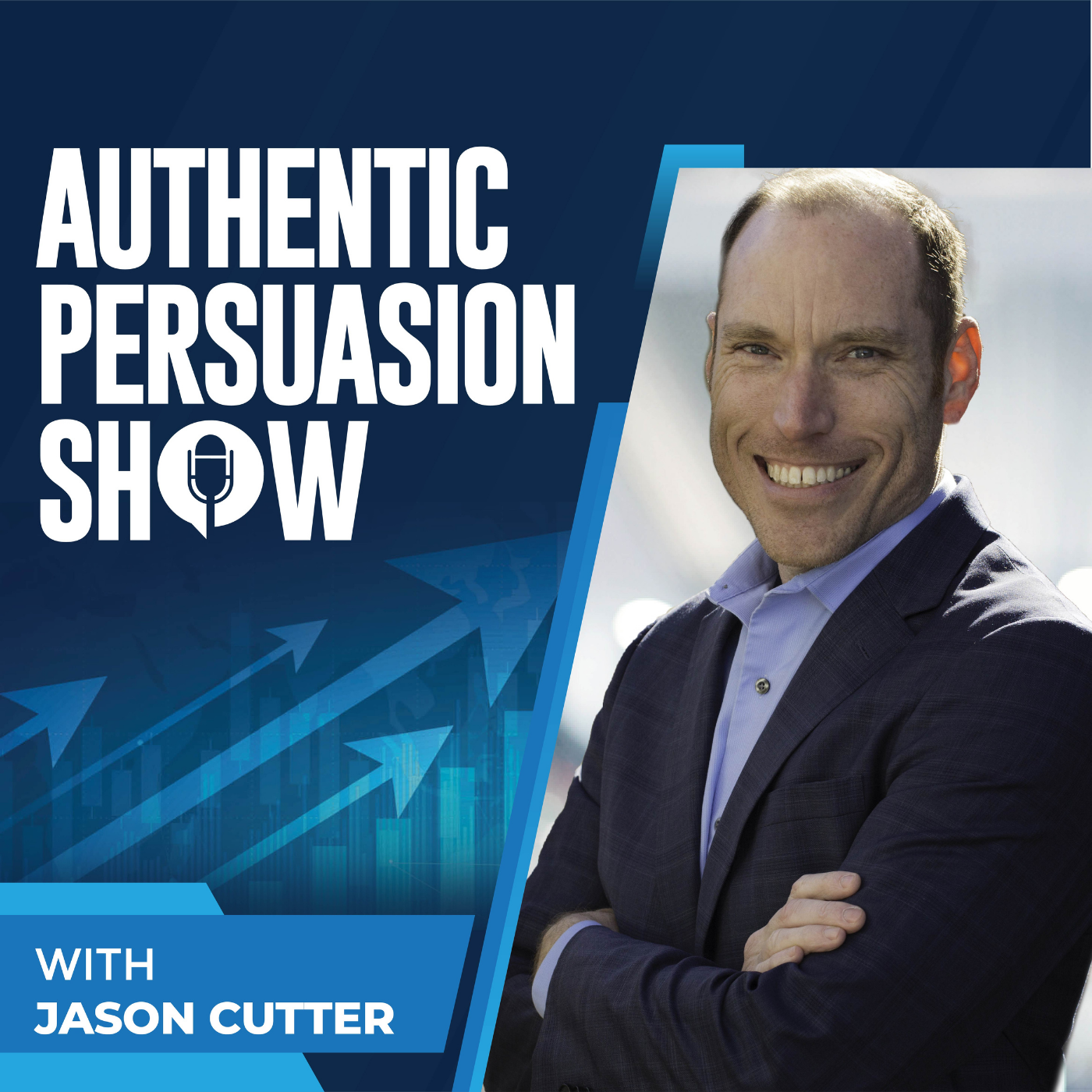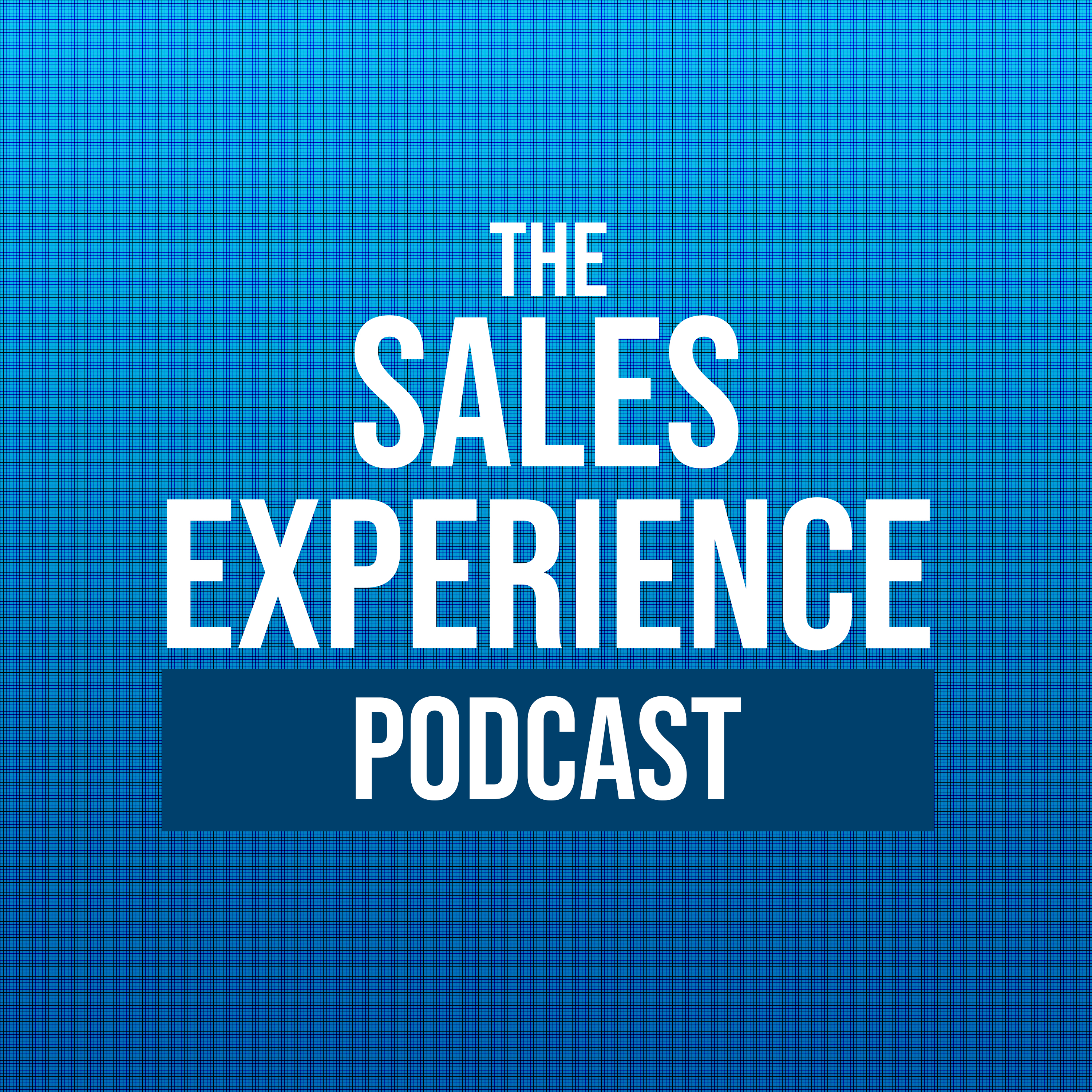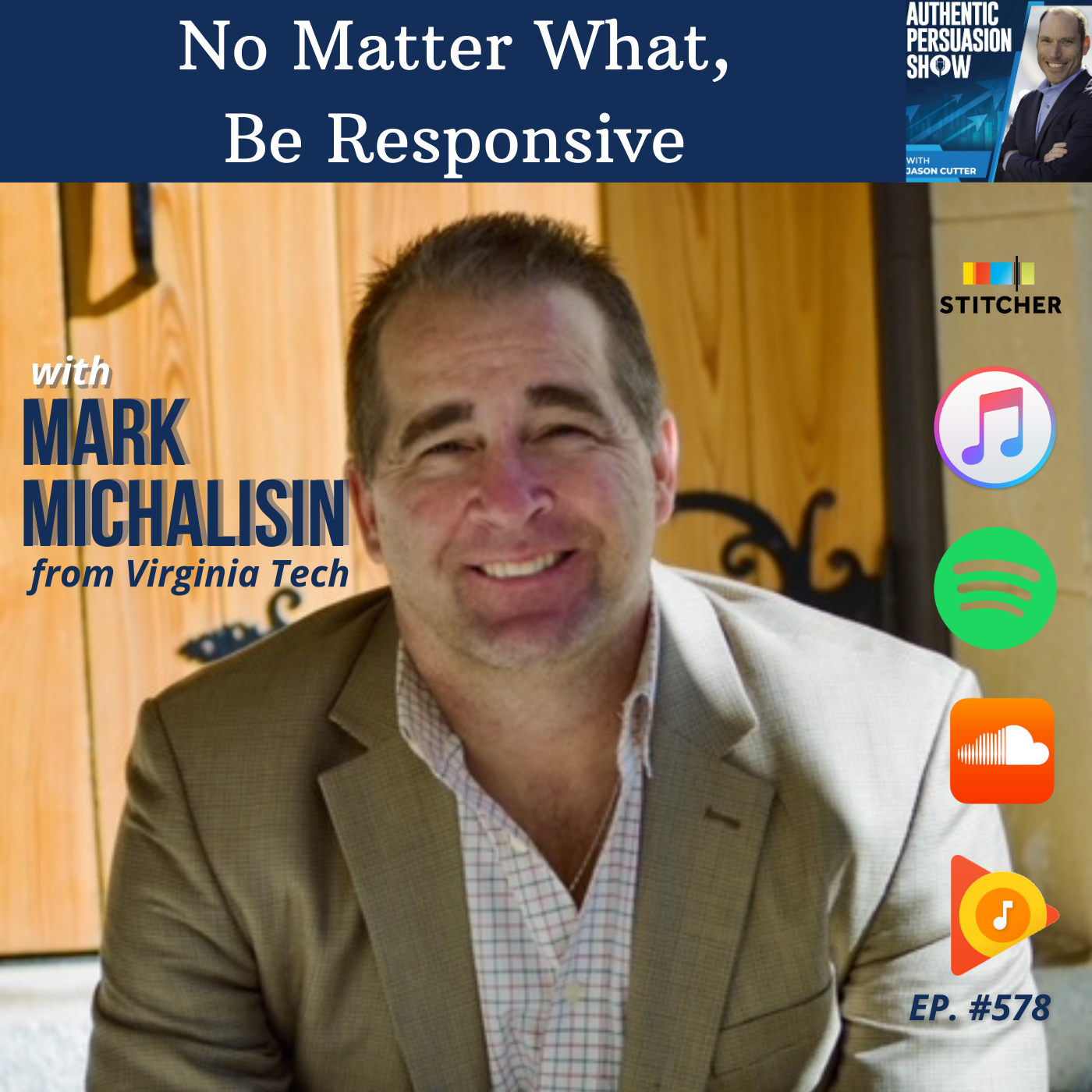Episode Transcript
Jason [00:00:00]:
You. This is the authentic persuasion show. Hey, what's going on, everybody? Welcome to episode 565 of the authentic Persuasion show. This is now week three of season seven. I don't normally do episodes like this, where I'm tracking the episode number, tracking the week. But this is quite a different conversation season for me of focusing and really telling this story of these professional educators and the impact that they're having out there. And so it's just really fun. It's different.
Jason [00:00:32]:
Right before, in the previous seasons of the podcast, I've had different guests, maybe in a theme, but not quite like this, where it's maybe a consultant over here or a tech company there or a call center manager there or a coach there or various experts in their field all kind of coming together. But it's just kind of a mishmash on the show this season, totally different, because everybody is in the same line of work, and it's just so fun. And then what happens is in the process of doing these, so many things come up. That's why I love doing the show. It's why I love these Friday, day, five of the week episodes that I'm recapping instead of taking the time away from the guest on the show, because it's really all about them. And I try to interject as little as possible of my own thoughts, but I love to add to it and then roll into questions. The Friday episodes give me a chance to kind of take what they've said, give you the Reader's Digest, the cliff notes, if you're familiar with either one of those, and then get on my soapbox on some things that I think are extra valuable and kind of run with what they said, what they mentioned. And so it's just really fun to do that in this mode.
Jason [00:01:46]:
Now, one of the things, and this week is about Barry Erickson from University of Washington and really excited about this series because he's coming at it from a long life of sales that is different than what I'm used to. And so in that mode, like many of these people, like even the last week, Lamar Johnson and Procter and Gamble and doing basically business to business, but face to face retail, consumer product, which I have no experience in any of those buckets in an industry, I don't come from b to b. I don't come from consumer product. I don't come from face to face. I don't come from retail. Right? So all of those are foreign to me, but the fundamentals are still the same. And so with Barry coming up this week, it's been fun because he's coming out from this enterprise sales. Obviously, the things that you'll hear in the show, and I don't want to give a lot of spoilers on it, but one of the big things that he mentioned is that, and this will be in the second part about the sales process and persuasion, is that, he said is that persuasion is a process.
Jason [00:02:52]:
And a lot of times when you might hear that, you could think, oh, well, that sounds like manipulation, right? Like if I'm planning persuasion and I have a process to it, then if it's that strategic and or let's say weaponized, which is a word that Gary Vee might use. So if I've weaponized a process of persuasion to implement it, then it's going to get over into manipulation. And I think that's fair, because if we look at the definition of persuasion, it's not clear, it's not evident that persuasion is positive and manipulation is bad. What's clear is that manipulation has no regard for the thing being manipulated. Again, I say this all the time, manipulation is a very clear definition. It's, I'm doing something to this other thing for my benefit and gain, and there's no regard for yours. We manipulate clay into a bowl, we manipulate wood into a table. Right? We manipulate things into things so that we get benefit out of it.
Jason [00:03:55]:
And we don't really care. We don't care what the clay thinks or the tree thought or whatever it is, we don't care because we're doing it for us and we want what we want out of that result. Obviously, salespeople have been doing that forever as humans. We've been doing that forever to other humans. And we do it even if you're not in sales. You will go in and out of manipulating or trying to manipulate other people if you're not careful, you're not conscious, and you're not aware. There's so many ways that we manipulate. It's not just about like, I'm trying to trick you into buying something, but scarcity.
Jason [00:04:29]:
Using the scarcity card is manipulation, right? A false sense of scarcity. I got somebody coming tomorrow. If you don't make this decision right, and if you don't have someone tomorrow, then that's manipulation because you're lying about now. If there is somebody that's genuine, it's not manipulation, it's just the facts. All depends on what's true and how you're using it. Same thing if it was in the personal world. There's so many different ways to manipulate, and I outline those in my book. There's very few parts where I kind of take a bunch of research and experts from other things in selling with authentic persuasion.
Jason [00:05:04]:
But that was one because I wanted to make it very clear what manipulation is versus persuasion. And manipulation is very, very clear about what that is, even to the point where in sales, offering discounts is a form of manipulation. If I say, well, if you buy it today, it'll be 10% off, that's manipulation. Now, most people don't think of it that way. It doesn't feel gross and slimy, unless maybe it's like on the car dealership lot or, hey, what will it take for you to buy today? If I give you a discount, will you buy today instead of walking away? If we think about pretty much every furniture store out there and what they do most weekends of the year is manipulation because they're offering discounts. Hey, it's the president say, hey, it's because it's a day that ends in y sale. And so here's a discount. It's like, well, now we just tune it out, and we assume that it's all bogus, and then it doesn't matter.
Jason [00:05:55]:
And so when we look at persuasion, though, in the definition, it's not clear. I use the term positive persuasion because I want it to have a positive intent and outcome. So it's win win, or I'm persuading you to do something that's beneficial, even if it doesn't benefit me. I still want you to benefit and get to a better place, but it's not so clear. So when you hear things like persuasion is a process, which is a quote that Barry said in the episode that'll be out on Wednesday, is that that might sound like manipulation, but the key is persuasion is a process. The reason that matters, and this has been a theme that's growing and growing over this season, and I mentioned it already several times on these solo episodes, is that the key is looking at the decision process. The decision process fundamentals. That's why I built my authentic persuasion pathway.
Jason [00:06:42]:
It's really not about a sales process because there's a lot of those, right? You want to do spin, you want to do challenger, you want to do medic, you want to do the Sandler pain submarine. Those are all sales processes. Those are tactics, strategies, motions that you want to go through. But what I'm talking about is the fundamentals at the decision making level. What is the decision process that the buyers are making? And those are pretty much fundamentally the same right. There's some truth to that. My guests are amazing because they all have lots of research on it and they're way smarter at that. Part of proving why that is, I just know what works, and what I've found works in the field with people.
Jason [00:07:19]:
But the key is the decision process. And so when you're looking at persuading and building a process and understanding that persuasion is a process, that's what you're focused on. And the key is, and I talk about this a lot, is that the person you're talking to is afraid of change. Funny enough, that's the thing. When I asked Barry about that, what keeps people from buying, he said, it's the fear of change. And we know that. Right? Because if they're not a customer of yours, they're afraid of change. They're in their comfort zone.
Jason [00:07:45]:
They're not ready to leave their comfort zone, and they need some help. And or if you do it wrong, they're going to stay in their comfort zone or dig deeper and deeper inside, being thankful they didn't buy from you, because that voice inside their head is going to say, wow, that was almost dangerous. That could have led to terrible things. I'm so glad I didn't buy from them. And really, the image I use and my pathway is all built around the fact that somebody is in their comfort zone and they are afraid of change. And your solution, your service, your product, anything you're selling, is outside of their comfort zone and requires change, even if they have familiarity with it, even if they already own it. Buying from you, who they've never bought from before, is change. It's dangerous and different.
Jason [00:08:26]:
It doesn't matter if they have a Toyota, but you work at a different Toyota dealership, you represent something different, and that is dangerous. And so you have to understand that. And that's where what he said, which was so great, is that persuasion is a process. You have to understand that. You have to understand what you're up against, and you have to understand how to get someone to move forward where they will listen to you. They have to get unstuck enough to listen, they have to trust you enough to listen, and then you have to keep them moving forward. And then here's the crazy part, here's the hard part, and a lot of salespeople stop here, and a lot of companies fail because of this, is that once you close the deal, air quotes, if you could see that, that's when, in my opinion, the sale really starts. That's when the effort really begins.
Jason [00:09:10]:
Because what happens is in the sales process, short or long, you've moved that person out of their comfort zone. They've accepted the risks of change, all of the dangers that go into that. Now what happens is you close the sale, salesperson moves on, company says, thank you for the customer. Now we're going to move forward with the customer and whatever that looks like. Now that person says, oh, my gosh, what did I do? They want to retreat to their comfort zone. That's where buyers remorse cancels, refunds, complaints. All kinds of things happen because their mind goes back into crazy mode, goes back into primal survival mode. Their amygdala says, oh, my gosh, what did we do? This was a huge mistake and we got to go back inside and be safe.
Jason [00:09:47]:
Let's get rid of it. Let's walk away from it. Let's pretend it never happened. And so persuasion is a process and then it's a constant process. It's a constant process to help people realize what the decision was that they made was the right one. It's in the best interest for them. It will help them, their company, their family, themselves, it doesn't matter. And then you've got to keep reminding of that.
Jason [00:10:08]:
So remember, when you build your process, focus on persuasion is the key. Focus on the decision making process is what you're focused on building around their decision making process, not yours. And then it's also a constant process. It's not a one and done. And then I get to move on. It's a constant thing. If they have a way to cancel refund, ask for a refund or return your product or complain about you. Right? Because that's the final part is to complain about you.
Jason [00:10:38]:
Then you must realize that it's a constant process. Now, a lot of people might sell door to door. I'm selling you this thing. I'm going to go away. And I'm hope you don't have an ability to cancel or refund or return the product. Now in the Internet era, they could then go online and destroy you and your reputation by complaining. And so remember, sales is a constant process. And remember, persuasion is a process.
![[565] Manipulation versus Persuasion](https://episodes.castos.com/salesexperiencepodcast/images/1474948/Manipulation-versus-Persuasion.png)


